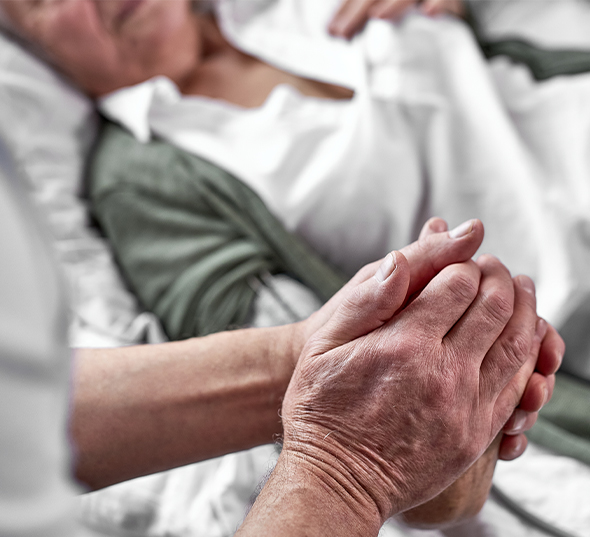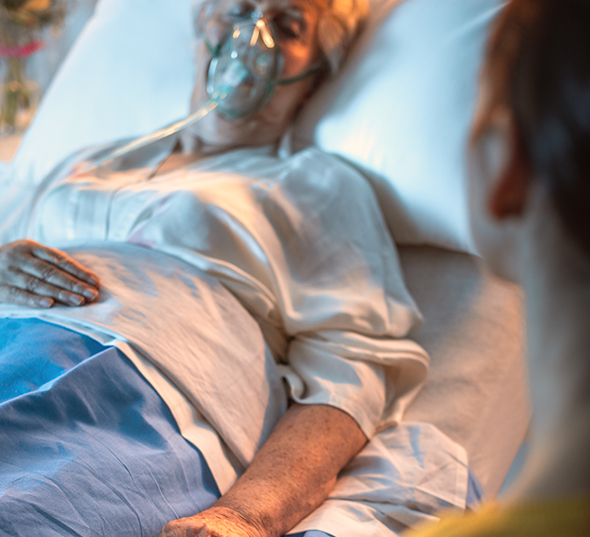Palliative Care

Ensuring our clients receive the highest quality of care at end of life
Reaching the end of your life can obviously be a very frightening prospect, but with
our care services, we are here to help make your last days, weeks, months or years
as fulfilling and enjoyable as possible. It is important to us that you and your family are prepared for your end of life, but that you are still able to achieve your goals, and in many cases, live as independently as possible.
At Harmony Healthcare, we focus on delivering palliative care in the comfort of your
own home. We want our clients to live a purposeful life, until the end. We will also
take your needs into consideration and will never make decisions on your care without your own wishes being taken into account. We are trusted and valued by
families who are dealing with difficult, end-of-life situations, and we have a strong
reputation within the care industry. With our palliative care at home, you will be able
to live as normal a life as possible, while being in safe hands at all times. Our carers
receive extensive clinical training, so that they are able to deliver the highest quality of service to you, whenever you need it. We will also provide emotional support, both to you and your family
Understanding Palliative care
Palliative care is a specific type of care for those with an illness that is degenerative.
Our palliative care services are designed to ensure you enjoy a high quality life and
are able to live as normal and independent a life as possible. Some of the conditions
that can lead to end-of-life care, including motor neurone disease and cancer
(depending on the prognosis.) Motor neurone disease for example, does not have any cure, and it can be progressive to the point where it can lead to death within just a year. It is important for us that you receive a high-quality level of care right up until the end. In some cases, the clients we offer
palliative care to only have days or weeks to live, and in other cases it could be
years. We provide the care you need, for emotional comfort as well as psychological
support. Palliative care need not be frightening, and it does not necessarily mean that you are going to reach the end soon. In some cases, it is difficult to know when
you might pass away, making it even more important that you live a fulfilling, happy
and independent life


The approach we take to palliative care
How we support you and your family with your palliative care needs. The first step in the process is to understand your needs and goals for your palliative care, and then devising a clinically led care plan. The care we offer is in the comfort of your home, so you can stick to your routine and the activities you enjoy. Our palliative care packages are tailored to suit the needs of our clients. There are no one-size fits all with our care plans, we ensure that we meet your needs, and deliver the right service to suit you. Regardless of your age, whether young or old, we will deliver a palliative care plan that will suit your individual needs.
As part of our palliative care service, we would with other organisations, including the NHS and therapists to ensure you receive a consistent, high quality care plan that stays consistent from start to finish. We are flexible in the palliative care services we offer, and these can be delivered at a time to suit you. If you require short term care for instance, we will be happy to provide this. We are also on hand to support your emergency care needs, both physically and emotionally.
Support every step of the way
Your journey is our journey, and we will respect you every step of the way. We know that receiving palliative care is extremely difficult, both for you and your family. Our carers will deal with you sensitively and will respect your needs, whatever they may be. Our palliative care is compassionate, patient and supportive. We want you to maximise your life while you are here & reach end of life in a peaceful way. Our carers will ensure that you don’t feel scared about end of life, with full support throughout your whole journey with us.
Case study for Palliative Care
Karen was 48 years old and had late stage breast cancer. She has a family
consisting of her husband and two 10-year-old sons. As her condition worsened, her
husband decided it might be best to get some palliative care for his wife, as he knew
she was reaching the end of life. She weighed only 5 stone at this point, and he
wanted her to be as comfortable as possible. He had to work and did not want to
leave her alone for prolonged periods of time, especially when the boys were at
school.
The nurse and carer provided support to Karen, including the medication and
equipment she required, and day to day support with housework, shopping and
providing emotional support. Although Karen was reluctant to use the palliative care
services at first, she began to view them as a godsend, especially for the emotional
support the nurses and carers provided to both her and her family. It eased the way
for her to pass without worrying too much, as her family had time to get used to the
inevitable and to adjust to a new way of life.
Sadly, Karen passed within a year of receiving the palliative care, but she did this
with dignity and happiness in her heart. She particularly appreciated the fact that she didn’t need to speak to her family about what was going to happen, the nurses and carers did this for her.
Palliative Care FAQ's
What is the difference between normal care and palliative care?
Palliative care is offering alongside your regular care service, with a focus on helping
ensure you live a high quality of life and that the end-of-life transition is as smooth as possible. With palliative care, we will provide a care plan that is specifically tailored
to you, while taking into account the needs of your family.
How do I know if need palliative care?
There is a common misconception that palliative care means that you are in the final
months or weeks of your life. In some cases, palliative care is given to people that
may live for years to come. The purpose of palliative care is to help ease the
physical and emotional pain associated with a terminal condition. You would usually
be referred to a palliative are specialist to start the process and you can refer
yourself or you may end up getting a referral.
Does it mean I’m dying if I use palliative care?
In most cases, someone using palliative care will have a terminal condition.
However, this is not always the case. They may be using palliative care to help with
severe symptoms, such as nausea and breathing difficulties. You can use palliative
care at any stage throughout the diagnosis of a serious condition.
How is palliative care different from hospice care?
Patients are generally moved into a hospice when they no longer wish to use
treatments that may help reduce the progression of an illness, and to just provide comfort for their final months, weeks or days. Palliative care is designed to provide
comfort for a serious condition in the comfort of your home.
Can I be forced into palliative care?
No, it is completely your decision if you decide to use palliative care. Your family may
try to encourage you, if they feel this is the right approach, but you should definitely
make up your own mind as to whether this is the best course of action for you. We
would not like to provide any level of care to someone that isn’t comfortable with it.
What benefits are there for palliative care?
Palliative care can provide comfort to the patient and support to families. It may help
to reduce the symptoms of the illness and provide some much-needed relief.
If you would like to read more about palliative care, you can take a look at our blog
on the benefits of palliative care